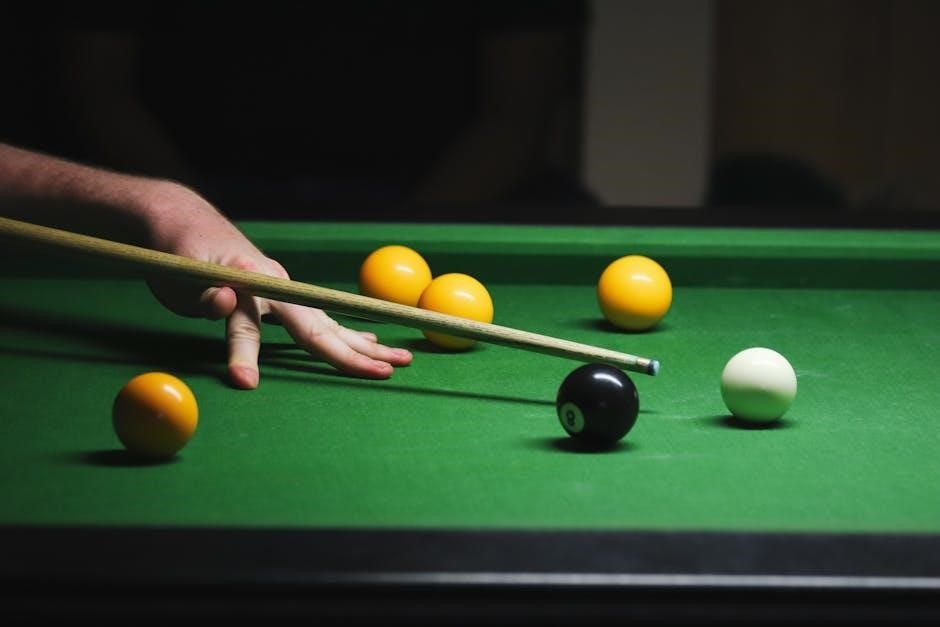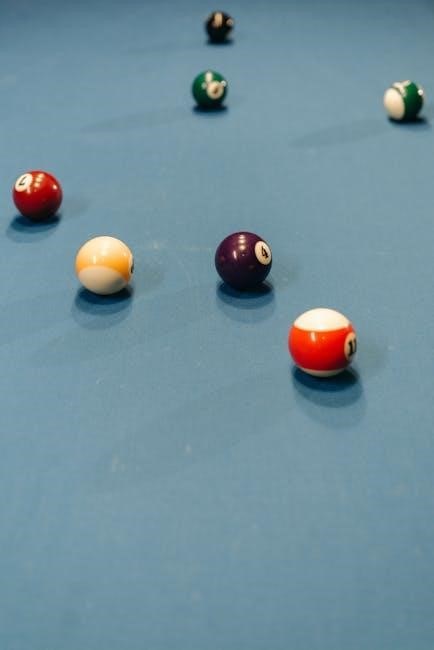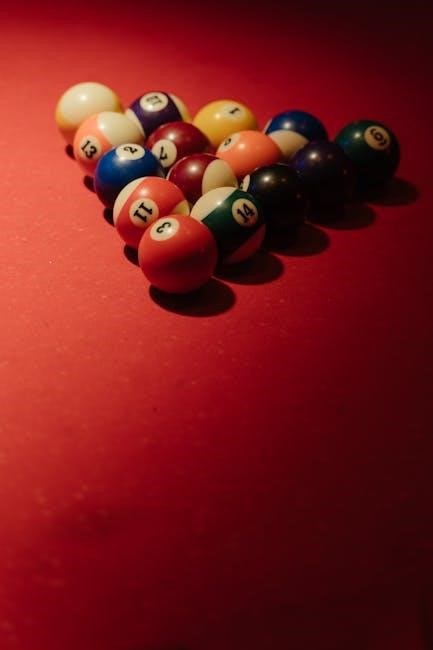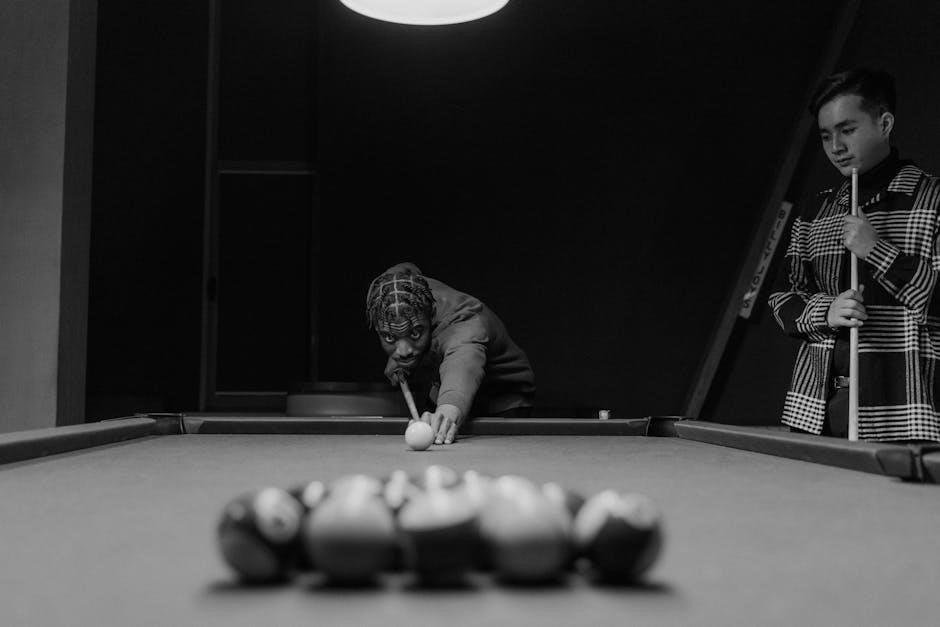
-
By:
- ida
- No comment
pool cue size guide
Understanding the right pool cue size is crucial for optimal performance. This guide explores standard lengths, tip sizes, materials, and weight considerations to help players choose the perfect cue.
1.1 Importance of Choosing the Right Pool Cue Size
Choosing the right pool cue size is essential for accuracy, control, and comfort. A cue that fits your height and playing style ensures better performance and reduces fatigue. The wrong size can hinder accuracy and cause discomfort, impacting your overall game. Proper sizing enhances stability and alignment, allowing for consistent shots and a more enjoyable experience. Selecting the ideal length, weight, and tip size tailored to your needs is crucial for mastering the game of pool.
1.2 Overview of Standard Pool Cue Dimensions
Standard pool cues typically range in length from 48 to 58 inches, with 57 inches being the most common for adults. The tip size usually measures between 12 to 13mm in diameter, providing a balanced strike. Cue weights generally fall between 18 to 21 ounces, offering a solid feel without being cumbersome. These dimensions ensure compatibility with various playing styles and table sizes, making them suitable for both casual and professional players. Proper sizing enhances control and accuracy, essential for a precise game.
Standard Lengths for Pool Cues
Standard pool cue lengths typically range from 48 to 58 inches, with 57 inches being the most common for adults, ensuring compatibility with various playing styles and table sizes.
2.1 57-Inch Pool Cues
The 57-inch pool cue is the most common length, favored by professionals and enthusiasts alike. It provides an ideal balance between reach and control, making it suitable for most adults. This length is particularly versatile, accommodating various playing styles and table sizes. Its widespread use in professional tournaments underscores its reliability and effectiveness for a broad range of players, ensuring a consistent and enjoyable gaming experience.
2.2 58-Inch Pool Cues
The 58-inch pool cue is a popular choice, offering a slightly longer reach than the 57-inch model. It is often preferred by taller players or those who need extra leverage for shots on larger tables. This cue size is also standard in American pool and provides a smooth stroke, making it ideal for players seeking precision and control. The 58-inch cue is versatile, catering to both casual and competitive environments, ensuring a consistent performance across various playing conditions.
2.3 48-Inch Pool Cues
The 48-inch pool cue is shorter than standard models, making it ideal for younger players or those with limited space. It provides better control for smaller players or tighter playing areas while still offering a solid strike. This cue size is also suitable for older children and shorter adults, ensuring they can play comfortably without compromising performance. The 48-inch cue is a practical choice for casual games or training, offering ease of handling and precision in smaller settings.

Pool Cue Tip Sizes
Pool cue tips vary in size, with standard diameters ranging from 12mm to 13mm. Smaller tips, like 9-10mm, are common in snooker cues for precision, while larger tips suit American pool for better ball control.
3.1 Standard Tip Sizes for Pool Cues
Standard tip sizes for pool cues typically range from 12mm to 13mm in diameter, offering a balance between control and accuracy. These sizes are widely used in American pool games, providing a consistent strike on the cue ball. Smaller tips, around 9-10mm, are favored in snooker for precision, while larger tips, up to 14mm, suit players needing more power and a softer hit, depending on personal preference and game requirements.
3.2 How to Choose the Right Tip Size
Choosing the right tip size depends on skill level, game type, and personal preference. Beginners often prefer larger tips (13mm+) for consistency, while experienced players opt for smaller tips (11-12mm) for precision. Snooker players typically use 9-10mm tips for accuracy, while American pool players favor 12-13mm tips for better control. Experimenting with different sizes can help determine the most comfortable and effective tip size for your playing style and game requirements.
Pool Cue Materials and Their Impact on Size
Pool cues are made from various materials, including wood, fiberglass, and graphite. Each material affects the cue’s weight, balance, and overall size, influencing performance.
4.1 Types of Materials Used for Pool Cues
Pool cues are crafted from diverse materials, each offering unique characteristics. Wood remains the traditional choice, prized for its feel and aesthetics. Fiberglass and graphite cues are durable and lightweight, ideal for travel. Composite materials blend wood and synthetic elements, providing consistency. Tips are often made from leather or phenolic resin for durability; Each material selection impacts the cue’s weight, balance, and overall performance, catering to different player preferences and needs.
4.2 How Material Affects Cue Size and Performance
Material significantly influences a pool cue’s size, weight, and performance. Wood cues are traditional and balanced, while graphite or fiberglass cues are lighter and more durable, often used in longer lengths. Composite materials offer consistency and resilience. The choice of material affects tip size, weight distribution, and overall feel, catering to different playing styles. Lighter materials may enhance maneuverability, while heavier ones provide stability, allowing players to customize their cues for optimal gameplay and personal preference.

Weight Considerations for Pool Cues
Pool cues typically weigh between 16 to 21 ounces. The right weight enhances control and power, allowing players to strike the ball with precision and consistency.
5.1 Standard Weight Range for Pool Cues
Pool cues typically weigh between 16 to 21 ounces, with 19-20 ounces being the most common choice for players. Lighter cues (16-18 ounces) offer better control for precise shots, while heavier cues (21 ounces and above) provide more power for stronger strikes. The weight distribution also plays a role in performance, balancing the cue’s feel and responsiveness during gameplay. Selecting the right weight ensures a comfortable and effective playing experience for players of all skill levels.
5.2 How to Select the Right Weight for Your Game
Choosing the right pool cue weight depends on your strength, style, and the type of game. Lighter cues (16-18 oz) suit players with a precise stroke, while heavier cues (21 oz+) are ideal for those who strike with more force. Test different weights to find comfort and control. A balanced cue enhances accuracy and power, ensuring a smooth playing experience tailored to your skill level and personal preference.

One-Piece vs. Two-Piece Pool Cues
One-piece cues offer a solid, consistent feel, while two-piece cues provide convenience and portability. Each design caters to different player preferences and needs, ensuring versatility.
6.1 Differences in Size and Design
One-piece cues are typically longer, ranging from 57 to 58 inches, offering a consistent feel and balance. Two-piece cues are slightly shorter, around 48-58 inches, designed for portability. Materials like wood, composite, or graphite vary in weight and durability. The joint in two-piece cues can affect weight distribution and playability. Generally, one-piece cues are preferred for professional play, while two-piece cues suit casual or traveling players, balancing size, convenience, and performance.
6.2 Which Type is Better for Different Players
One-piece cues are ideal for professional or serious players seeking consistent performance and balance. Two-piece cues, with their portability, suit casual or traveling players. Professional tournaments often favor one-piece cues for their precise playability. Casual players benefit from the convenience of two-piece cues, which are easier to transport. Ultimately, the choice depends on the player’s skill level, playing frequency, and personal preference regarding size, weight, and portability.

Specialized Pool Cue Sizes
Specialized cues cater to specific needs: children’s cues are shorter for easier handling, while travel cues are collapsible for portability, ensuring versatility for different players and situations.
7.1 Pool Cues for Children
Pool cues for children are designed to be shorter and lighter, making them easier to handle. A 48-inch cue is often recommended for older children, providing better control and accuracy. These cues are tailored to smaller players, ensuring comfort and proper technique development. They typically weigh less than standard cues, reducing fatigue during play. Parents should consider their child’s height and strength when selecting a cue, ensuring it fits their needs for an enjoyable and effective learning experience.
7.2 Travel Pool Cues
Travel pool cues are designed for portability, often featuring a two-piece design that allows easy disassembly and storage. These cues are ideal for players who need to transport their equipment frequently. They typically include a durable case for protection during travel. Despite their compact design, travel cues maintain standard playability and performance. They are a practical choice for players who value convenience without compromising on quality, ensuring they can enjoy their game wherever they go.

Game-Specific Pool Cue Sizes
Game-specific pool cues are tailored to meet the unique demands of each cue sport, ensuring optimal performance and precision for players of all skill levels with specialized designs.
8.1 Snooker Cues
Snooker cues are standardized at 58 inches in length and typically weigh between 16.5 to 20 ounces. They feature narrower tips, usually 9 to 10mm, designed for precision. The cues are crafted from high-quality materials like ash or maple, ensuring durability and consistent performance. This specific design caters to the demands of snooker, emphasizing accuracy and control for players competing at advanced levels. The dimensions and weight distribution are optimized for the game’s unique requirements, making snooker cues a preferred choice among professionals.
8.2 Carom Billiard Cues
Carom billiard cues are designed with a conical taper and smaller tip diameters for precision. They typically measure 54-56 inches in length, slightly shorter than standard pool cues. These cues often feature a collarless, wood-to-wood joint and a lightweight design to enhance accuracy and control. The materials, such as ash or maple, ensure durability and consistent performance, making them ideal for the fast-paced, strategic nature of carom billiards. Their unique design caters specifically to the demands of this classic game.